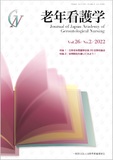Japanese
English
- 販売していません
- Abstract 文献概要
- 参考文献 Reference
抄録
目的:特別養護老人ホームに暮らす重度認知症高齢者のエンド・オブ・ライフに対する価値観の表出を促す看護援助を明らかにすることである.
方法:事例研究法を用いた.先行研究から作成した看護援助の方針を基に実践し,得られたデータを記述し,目的に沿った看護援助を抽出,分類した.
結果:【意思を伝える力を発揮できる環境を整える】【今の姿に繋がる埋もれがちな生き方に厚い関心を寄せる】【今その時を安心して過ごせる基盤となるものを言動から捉える】【望む最期を見据えた対話を繰り返し高齢者の一生を紡ぐ】【人生を共に歩んできた高齢者と家族の思いを共有し絆を深める】の5つの大分類が抽出された.
考察:自らの思いを他者に伝えることが難しい重度認知症高齢者の過去,現在,最期を見据えた思いや願いを含む価値観の表出を促す看護援助が示されたことから,高齢者と家族の希望する最期の実現に繋がると考える.
Purpose: To clarify the type of nursing care which can encourage the expression of values at the end-of-life stage of an older adult with severe dementia living in a nursing home.
Method: Case study research was conducted. We described the data obtained through the practice of the nursing care policy created from the previous studies, and extracted and classified the type of nursing care according to the purpose.
Results: Five large classifications were identified: to “improve an environment where the ability to express oneself can be exercised”; “take a deep and warm interest in the often overlooked lifestyle which contributed to one's current state”; “discern the words and actions which can be a basis for secure living in the present”; “interact with the older adult through repeated communications taking into account their desired end of life, as part of the tapestry of their life”; and “share the emotions and deepen the bond of the older adult and their families.”
Discussion: The above classifications of nursing care have been presented as specific care which enable the older adult with severe dementia having difficulties expressing themselves to express their thoughts, wishes and other values in view of their past, present, and end of life. We think that such nursing care will contribute to a desirable end of life for such older adults and their families.
Copyright © 2022, Japan Academy of Gerontological Nursing All rights reserved.


